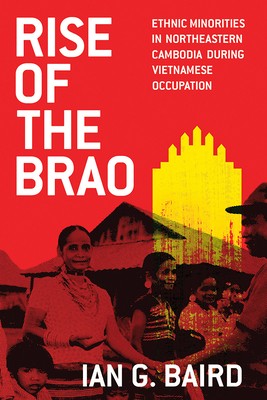
- We will send in 10–14 business days.
- Author: Ian G Baird
- Publisher: University of Wisconsin Press
- ISBN-10: 0299326101
- ISBN-13: 9780299326104
- Format: 15.8 x 23.1 x 2.3 cm, hardcover
- Language: English
- SAVE -10% with code: EXTRA
Reviews
Description
In the early 1970s, the Khmer Rouge had become suspicious of communist Vietnam and began to persecute Cambodian ethnic groups who had ties to the country, including the Brao Amba in the northeast. Many fled north as political refugees, and some joined the Vietnamese effort to depose the Khmer Rouge a few years later. The subsequent ten-year occupation is remembered by many Cambodians as a time of further oppression, but this volume reveals an unexpected dimension of this troubled past. Trusted by the Vietnamese, the Brao were installed in positions of great authority in the new government only to gradually lose their influence when Vietnam withdrew from Cambodia.
Based on detailed research and interviews, Ian G. Baird documents this golden age of the Brao, including the voices of those who are too frequently omitted from official records. Rise of the Brao challenges scholars to look beyond the prevailing historical narratives to consider the nuanced perspectives of peripheral or marginal regions.
EXTRA 10 % discount with code: EXTRA
The promotion ends in 17d.06:42:24
The discount code is valid when purchasing from 10 €. Discounts do not stack.
- Author: Ian G Baird
- Publisher: University of Wisconsin Press
- ISBN-10: 0299326101
- ISBN-13: 9780299326104
- Format: 15.8 x 23.1 x 2.3 cm, hardcover
- Language: English English
In the early 1970s, the Khmer Rouge had become suspicious of communist Vietnam and began to persecute Cambodian ethnic groups who had ties to the country, including the Brao Amba in the northeast. Many fled north as political refugees, and some joined the Vietnamese effort to depose the Khmer Rouge a few years later. The subsequent ten-year occupation is remembered by many Cambodians as a time of further oppression, but this volume reveals an unexpected dimension of this troubled past. Trusted by the Vietnamese, the Brao were installed in positions of great authority in the new government only to gradually lose their influence when Vietnam withdrew from Cambodia.
Based on detailed research and interviews, Ian G. Baird documents this golden age of the Brao, including the voices of those who are too frequently omitted from official records. Rise of the Brao challenges scholars to look beyond the prevailing historical narratives to consider the nuanced perspectives of peripheral or marginal regions.


Reviews